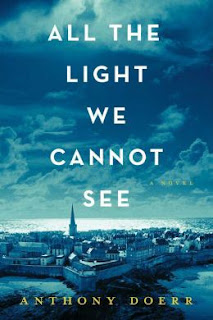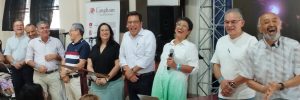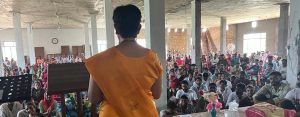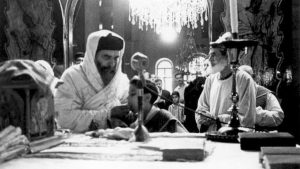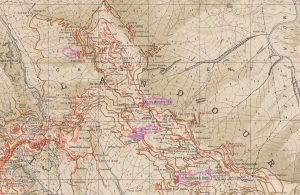I hopped on the ferry in Portsmouth one Saturday evening, sleeping diagonally on the tiny bed overnight and squeezing vertically into the shower in the early morning. I spent the Sunday near St Malo with my colleagues, Mike and Marie-Laure. Then it was back on the ferry to Portsmouth on Sunday evening – and yes, once again sleeping diagonally on the tiny bed overnight and squeezing vertically into the shower in the early morning.
Such is the story of France and I.
However last month I revisited France in my imagination, reading through Anthony Doerr’s All the Light We Cannot See. It was kinda eerie because the novel is focused on St Malo, while the main character is Marie-Laure!
The story is set in World War 2, alternating the events in the life of a blind girl in France with a teenage German radio enthusiast. She with the lovely father (‘He made her the glowing hot center of his life; he made her feel as if every step she took was important’, 403); he with no father, an orphan. As the plot builds and the characters deepen, you know they are going to meet one day. This kept the pages turning until that day when they meet. On that day the pages stopped turning. The world around me shut down (even though it was the first full day back home in New Zealand for our son’s wedding). I read slowly, even aloud, as I savoured every word and imagined myself in every twist, every turn. A moment to remember in my reading career.
Seeing the world of war from the perspective of a girl who is blind, overhearing the reluctance to be at war in a young Nazi lad, and reading how listening to the radio (tying ‘a million ears to a single mouth’, 63) brings the two of them together during a war – it all proved to be so fresh, so fascinating. This was topped off by the scratchy irritation, lasting through the season of O Holy Night and O Little Town of Bethlehem, with the denouement of the story not being as I was hoping it would be.
The book is a 2015 Pulitzer Prize winner about which many eloquent things have been said and so, as a teacher of preaching, I want to focus on one area. The exquisite writing. The use of verbs and nouns. The word pictures. The way a single word can serve as an illustration.
A dozen pigeons on the cathedral spire cataract down its length and wheel out over the sea (11).
Out of loudspeakers all around Zollverein, the staccato voice of the Reich grows like some imperturbable tree; its subjects lean towards its branches as if toward the lips of God. And when God stops whispering, they become desperate for someone who can put things right (63).
Frau Elena: strands of hair stuck to her cheeks, maroon aprons under her eyes… (124).
…as profitable as picking feathers out of molasses (126).
The welcome hiss of the wind washes in, or maybe it is the sea and the wind, her ears unable to unbraid the two (129).
Marie-Laure is glad to hear a smile enter his voice. But beneath it she can sense his thoughts fluttering like trapped birds (129).
Doubts: slipping in like eels (133).
Since the visit to Berlin, a great dread has been blooming inside Werner’s chest. It came gradually, as slow moving as the sun’s passage across the sky (227).
At least, out on the beaches, her privation and fear are rinsed away by wind and color and light (243).
Russia collapses like an accordion (262).
Streets sucked empty one by one. Each time she steps outside, she becomes aware of all the windows above her. The quiet is fretful, unnatural. It’s what a mouse must feel, she thinks, as it steps from its hole into the open blades of a meadow, never knowing what shadow might come cruising above (274).
When she lets herself in, she hears the rattle first. As though a weary tide stirs stones in the old woman’s lungs (298).
A wooden step complains beneath his weight (304).
One of his boots has lost its lace, and its tongue lolls cannibalistically (317).
Inside von Rumpel, hope braids with desperation; he is almost there (357).
…and he watches her continue up the street until the fog swallows her (413).
That first peach slithers down his throat like rapture. A sunrise in his mouth (471).
Her voice like a bright, clear window of sky. Her face a field of freckles (475).
Memories cartwheel out of her head and tumble across the floor (506).
Now when I tell students, “Depend on verbs and nouns, rather than always seeing adverbs and adjectives as the secret”, I have somewhere to come. I can come here to cataract and wheel, to unbraid and rinse and braid, and to cartwheel and tumble. Now when I tell students, “Create your own word pictures”, I can come here to the tree and the apron, the feathers and the birds, the eels and the accordion, the mouse and the tide, the step and the boot – and to that glorious peach.
nice chatting
Paul
PS. I stumbled across this little clip of the author speaking about how the book came into being. No Spoiler Alert, so don’t worry, if you have yet to read the book.
About Me

the art of unpacking
After a childhood in India, a theological training in the USA and a pastoral ministry in Southland (New Zealand), I spent twenty years in theological education in New Zealand — first at Laidlaw College and then at Carey Baptist College, where I served as principal. In 2009 I began working with Langham Partnership and since 2013 I have been the Programme Director (Langham Preaching). Through it all I've cherished the experience of the 'gracious hand of God upon me' and I've relished the opportunity to 'unpack', or exegete, all that I encounter in my walk through life with Jesus.
Recent Posts
Football helps me train preachers. See, when you speak to me about football—or, ‘footie’—I need to know where your feet are before I can understand what you mean. Are your feet in Ireland, or Brazil, or the USA, or NZ—or in crazy Australia? It must be the most fanatical sporting nation in the world. Within…
Having been born in 1959, I don’t remember much about the 1960s. But I have heard a lot. Hippies. Drugs. Rock ‘n Roll. Assassinations. Moon-walking. A quick trip across to ChatGPT informs me immediately that it was ‘a transformative decade across the world’—marked by the civil rights and feminist movements, Cold War tensions, consumerism and…
